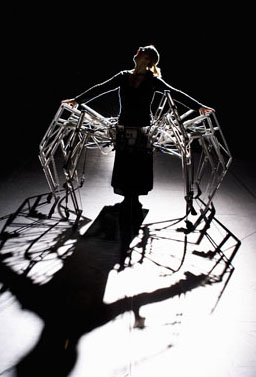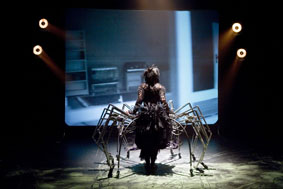 Stina Nordenstam reluctantly writes for the stage Stina Nordenstam reluctantly writes for the stage
by Calle Pauli
Published: DN October 29th 2005
Stina Nordenstam works on stagemusic for the first time. It's for Peder
Bjurmans play "Tarantula" on Orionteatern. But in reality she
doesn't like theater.
"Tarantula" is a monologue about
a horror-movie actress who gets her lower body replaced for spider's legs.
Her role threatens to eat her and she chases her lost identity. She is protrayed
by actress Anna Pettersson.
- Actually, I rather dislike the theater.
That's almost the first thing Stina Nordenstam says when we speak of this,
her first cohesive work for the stage. What she has against theater is that
it's built on the agreement of "this isn't true".
She likes movies better.
- My entrypoint to film is escapism. The first task of film is to make the
escape as accessible as possible. To me it's about a balance between mainstream
taste and my high standards of being taken for a ride, of being seduced.
You turn agains the lack of truth in theater and turn towards the escapism
of film. It sounds like a paradox.
- The illusion is supposed to be convincing and it is the most convincing
when it's close to the documentary.
The word "documentary" returns several times during our conversation.
Stina Nordenstam tells me that she applied for Dramatiska Institutet a decade
or so ago, both to the documentary filmmaker program and the director program.
At the last interview she couldn't pick so she didn't get in.
- The closeness to the documentary aspects is very important to me. Reality
is suggested to us in different ways. In my music I'm always documenting
the ideas, associations and whims that come to me.
But within the concept of documentary there is no room for the special relationship
that the theatre has with truth. Still, she thinks it's very logical that
she's working on music for the stage now. She's a bit surprised that she
hasn't done it before.
- With my records I have a constant need of development - every new recording
session is a new situation and has to give something new. I've though for
a very long time that it would be exciting to combine my main profession,
which is to record albums, with writing for other contexts.
Stina Nordenstam says that she feels very well prepared to write for the
stage.
- But I have to understand why they want me and they have to agree that
it's a good idea to work with me. Otherwise it won't work!
For "Tarantula" Stina Nordenstam wanted to give the music a commenting
role of its own, a role to act with and act against. A welcome advance for
her is that she has been able to compose a cohesive suite of instrumental
music, something she hasn't done before to this degree. It's possible that
it ends up on a record.
- My vocal expression can be a restriction, it takes all the attention.
The music also deserves to be heard.
Peder Bjurman wanted two songs in the play that the actress Anna Pettersson
was supposed to sing. But during rehearsals it showed that it didn't work
with the role.
- Which one of her was supposed to sing?
That is how Stina Nordenstam describes the dilemma.
The songs were recorded instead. One of them is now sung by a young boy
and the other by herself. She wrote the lyrics herself.
Stina Nordenstam says that when she's collaborated with other people she
prepares by asking a lot of questions, so many that she wonders how people
have been able to stand her. That's what she did this summer with the sound
installation "Tänk dig en människa" in a pavillion in
the garden next to Magasin 3, and that's what she did with "Tarantula".
- Then I've pulled away and maybe I haven't used the answers I got that
much.
In "Tänk dig en människa" she mixed pieces of recorded
interviews with newly composed music. The theme of the installation was
how people survive traumas and catastrophes. A theme closely related to
the vulnerable spiderwoman seeking her lost identity.
 Calle Pauli Calle Pauli
|